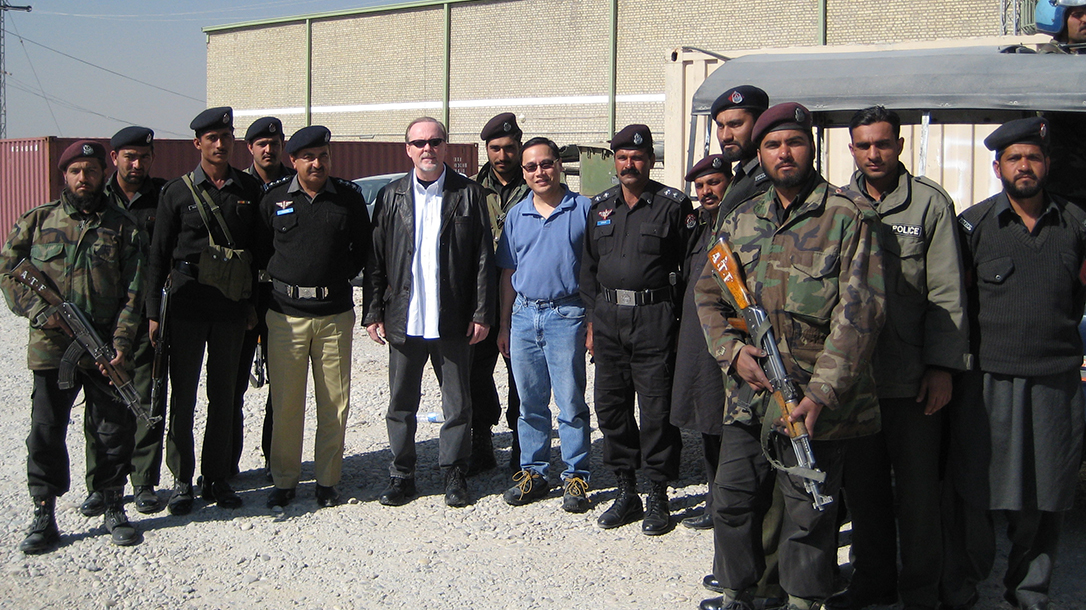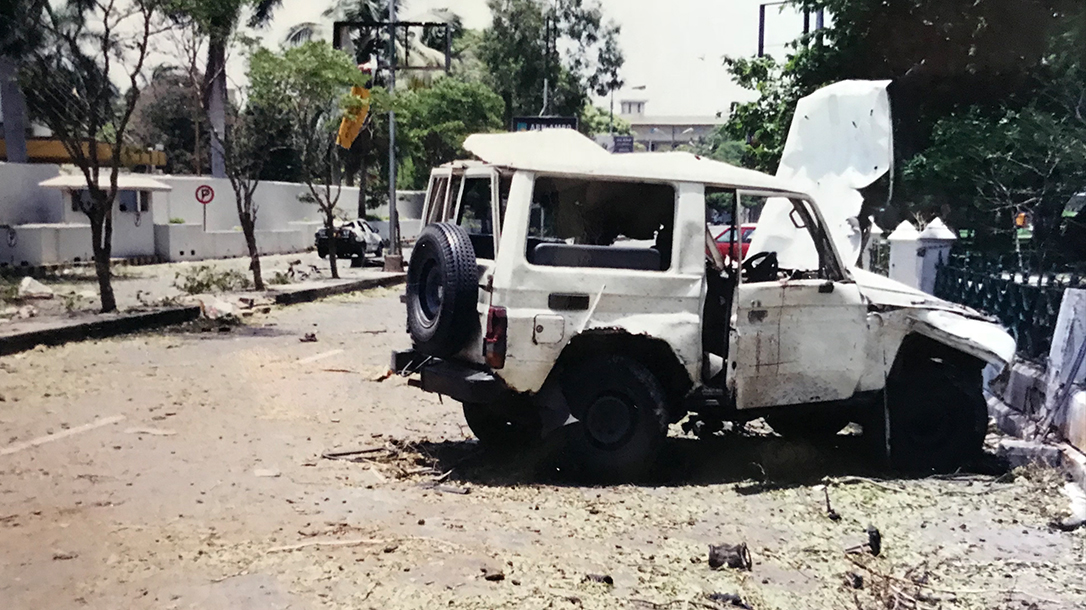I Survived Multiple Assassination Attempts. That’s not something a lot of folks can honestly say. I’ve known Randall Bennett for more than a decade now. It’s great to not only finally be able to share certain things from his time as a DSS (Diplomatic Security Service) agent but also to bring light to the Diplomatic Security Service itself. His countless missions span more than 50 countries over 25 years. From evacuating embassies and consulates, tracking down José Padilla (the “Dirty Bomber”), being the RSO in Iraq in 2006-2007, working with Blackwater, operating with some of the world’s most elite military units, and much more, his story is one of heroism and duty. His time in Pakistan hunting Al-Qaeda while they tried to kill him is only part of his fascinating story.
How I Survived Multiple Assassination Attempts
Explain to our readers about the DSS and being an agent.
Randall: The Diplomatic Security Service is, without a doubt, the most elite Federal Law Enforcement Organization protecting America. We handle criminal investigations, counter-terrorism investigations, counter-intelligence investigations, and a plethora of miscellaneous investigative challenges. We’re the “best least-known federal agents in the world.”
How many years have you been in the DSS?
Randall: About 27 years. I semi-retired in 2011, but still go out on DS assignments to embassies around the world for about three months each year. Thirty-seven years old was the maximum age one could be to be accepted into the Federal Law Enforcement Service, so I was one year under the limit.

Karachi During 9/11
Randall: Yes, it was the end of my extended third year. I loved it there. I was on the frontline in the streets of Karachi. There is most definitely what you would call a “skillset” for living and operating like that. Al-Qaeda was losing numbers due to our direct efforts before most of the world would learn who they were. We were saving lives and making a difference. None of us could have imagined what we watched on 9/11 that day. We knew that Karachi, as well as other parts of Pakistan, were always a nexus to almost every terrorist act in the world.
There was great concern that the normal critical threat to Americans there might be enhanced and that attacks would be coming during the night. We had substantial security forces in place around the neighborhoods, but if a terrorist wanted to drive a car bomb into my neighborhood perimeter, the driver might die from gunfire, but the car would still hit the perimeter and detonate, opening a huge hole that a second vehicle full of explosives would then charge through and be able to hit any house he wanted. Though we were experiencing this tactic at the time, years later, it became known as the “Jeddah scenario,” a standard terrorist tactic.
The Case of Daniel Pearl
Daniel Pearl traveled to Pakistan for his investigation of Richard Reed, the “Shoe Bomber,” while you were there.
Randall: Yes, Daniel Pearl was my case. The book Mariane Pearl wrote about her life with Danny and his terrible end, as well as the film, was a love story and contained insights into his intellect, wit, good nature, and strong character. It contained very little of the actual behind-the-scenes case. Nothing could capture the essence and chaos of the city and the environment we worked in. The facts were not totally accurate and were sorely incomplete. But when you have Angelina Jolie playing the lead role in the film adaptation, you revise the story around her instead of the investigative facts and the team who dealt with the case.
I go into great detail in my book regarding Danny Pearl. In the end, I was able to recover his body — which was in 10 pieces — from the burial site, and we were able to get it home to his family for closure. Even with all our successes in Karachi, I still felt I had failed Mariane, and I have to carry that with me forever.
Tell us about Al-Qaeda’s attempts to assassinate you.
Randall: Al-Qaeda knew who I was soon after my arrival in Karachi. I survived Assassination Attempts by catching quite a few of them and lessening their numbers. There are others who were captured that will not be discussed in any books or articles. Many operations will remain outside the scope of scrutiny. This success put my name in the local Urdu-language newspaper every day for a while, and not in a good way. Local Al-Qaeda elements wanted to retire me in a bad way. The more success I had, the more determined they were that I had to be eliminated. They tried mobile vehicle suicide bombs chasing after me, and eventually, a large vehicle suicide bomber (160 kilos of high explosives).
The large vehicle was at the Karachi U.S. Consulate, right?
Randall: June 2002. I would hold a regular RSO all-hands meeting in my office at 1100 hours. My office was located at the end of the building closest to the Marriott Hotel. We had been having military visitors who were there to evaluate the possible need for rescuing and evacuating us to the ship if things went horribly wrong in Karachi. Were they kidding me? We lived our lives in Karachi in the middle of things going horribly wrong daily.

Right before our 1100 meeting a Marine major had convinced me to postpone the meeting to come look at some items we had been discussing during the week. It was the only time he could do it, so I pushed back my 1100 meeting. Ten minutes after arriving at the meeting location with the Marine Major, we heard the giant explosion back at the consulate. Al-Qaeda had learned of my 1100 meeting and sent a truck full of explosives, which detonated right outside my office, injuring and killing quite a few people.
You continued to hunt down Al-Qaeda.
Randall: Yes, the CIA allowed me to go on some home raids and collect a lot of data, which led to arrests. Al-Qaeda used to put weekly articles in the newspaper “The Jang,” a very anti-American paper, stating that they were coming to get me (by my name) and constantly threatening me. I would irritate them by telling them back through the paper that I was waiting for them, hoping they would make the mistake of coming for me. Several times when I was driving my vehicle I would notice a vehicle behind several cars fighting to catch up to me. It was obvious who they were and that they wanted to get up next to me to detonate.
While in Karachi, you had the necessary freedom to get the job done?
Randall: When I was pretty rogue according to Federal Agent standards, especially in the Pearl case, running around at night with my Pakistani Assault Squad, the State Department and the White House heard about all the danger I was in (and encouraging) and became concerned. They wanted to yank my chain back. President Bush was insisting on reading my cable about the previous night’s adventures first thing each morning, and he told them all, “Leave Randall alone; he’s doing God’s work.” That saved me and allowed me to continue my campaign to eliminate the bad guys.
Then Al-Qaeda’s favorite target finally left.
Randall: The last attempt to kill me was the day I was leaving Karachi. My friend, an ISI Colonel, advised me that they had someone inside the Karachi Al-Qaeda operation and that Al-Qaeda had learned my flight and time and were making plans to keep me from leaving Pakistan alive. I’ll give them points for dedication to their cause!
There’s really only one way to get to the airport. With no time to waste, the Colonel had me in a 10-vehicle escort with mounted-up machine guns, motorcycles and route clearers along with other armored vehicles to protect the sides of my consulate armored vehicle. At the airport, to my surprise, were also about 50 of my local police friends from all over the Province who were there to say goodbye. From there, I received an escort through without waiting on any paperwork or customs. I was escorted onto the plane in my protective diamond and guarded until we began to taxi out.
From there, you went to Iraq?
Randall: Actually, I went to Spain to get my target profile reduced and ended up chasing Al-Qaeda following the Madrid train bombings. Then Iraq. It was a madhouse, and my tour of 2006-2007 was the worst of the entire incursion. I was the RSO, and my Blackwater personnel were exceptional. They risked their lives to save others and deserved more credit and less bullshit from the politicians back home. That’s another story.
Randall’s book “Taking Up the Sword: A Story of a Special Agent in the Diplomatic Security Service” is available on Amazon.





















